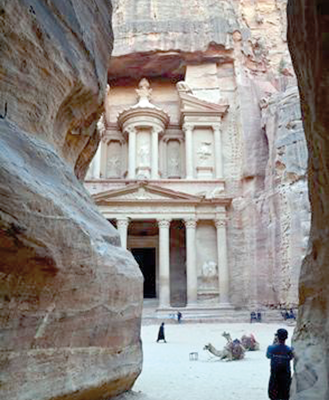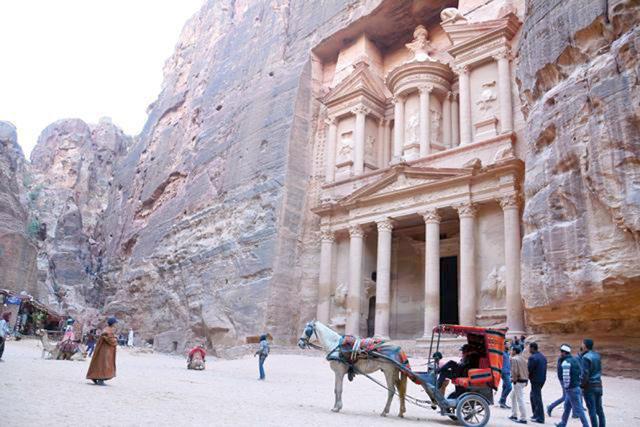You are here
Wadi Rum residents insist area safe for tourists, criticise ministry ban
By Ahmed Bani Mustafa - Jul 25,2017 - Last updated at Jul 25,2017

Wadi Rum is part of ‘the Golden Triangle’ of tourist attractions in Jordan (Photo by Ahmed Bani Mustafa)
AMMAN — Residents of Wadi Rum have complained of Tourism Ministry’s ban on tourists’ trips to their area, insisting that the area is safe for guests and unaffected by tribal protests over the Jafer case.
The Ministry of Tourism on Saturday instructed tour operators not to take tourists to Wadi Rum, according to a ministry document obtained by The Jordan Times on Monday.
The ministry issued the instructions to Jordanian travel agencies, directing them not to send tourists to Wadi Rum, 300km south of Amman, and to avoid some roads in the south of the Kingdom, for fear of possible violence.
The decision came after the Huwaitat, one of the largest tribes in southern Jordan, protested a court ruling sentencing a Jordanian soldier to life in prison for the killing of three US soldiers at a military base in Jafer in Maan Governorate.
Despite repeated attempts by The Jordan Times, Tourism Ministry officials were not available for comment.
Abu Mohammad, a local who owns a tourist camp in Wadi Rum, told The Jordan Times on Monday that the measure has harmed the local community, which relies on tourism as the main source of income.
He also described the decision as “unnecessary”, saying that “the locals are bedouins, one of whose main values is protecting guests, including tourists”.
“This week I was supposed to host two tourist groups at my camp. However, they were sent to Aqaba and Petra because of the decision,” Abu Mohammad said.
Nasser Zawaydeh, Wadi Rum region director, told The Jordan Times that the decision is “unfair”, as tourism is the main source of income for locals.
He also argued that, even during the “worst” times of the “Arab Spring” in 2011, no tourists were hurt.
The ministry issued the instructions “without consulting with other concerned agencies”, such as the Aqaba Special Economic Zone Authority, Zawaydeh claimed.
He also noted that some tourists are being “covertly hosted” by locals in Wadi Rum, despite the ban.
“We were told not to use the Rajif Road, near Wadi Rum; instead, we used the Dead Sea road to go to Aqaba,” a tourist guide, who preferred not to be named, told The Jordan Times.
The authorities took the decision as a “preventative measure”, the guide said, adding that even if nothing happened, the authorities “cannot wait until it does”.
“As a travel agent, I have to comply with the instructions, despite the fact that it would ruin the whole trip by cancelling Wadi Rum from the itinerary,” another travel agent, who also preferred to remain anonymous, said.
The decision “does not serve tourism,” as some people have already booked and paid for the trip in advance and given that the high season is approaching, they added.
Meanwhile, Jordan Tourism Board (JTB) Managing Director Abed Al Razzaq Arabiyat told The Jordan Times that the board did not issue the instructions.
Also known as “The Valley of the Moon”, Wadi Rum is listed as one of UNESCO’s World Heritage Sites.
Wadi Rum is part of “the Golden Triangle” of tourist attractions in Jordan, along with Aqaba and Petra.
The desert valley was mentioned in Greek and Roman ancient history accounts, and was described by Lawrence of Arabia as “vast, echoing and godlike”.
It has provided the scenery for several Hollywood films, including “Lawrence of Arabia” and “The Martian”.
Related Articles
AMMAN — The recent growth in the number of tourists visiting the Kingdom has resulted in a major boom in excursions to local archaeolo
AMMAN — The Cabinet on Wednesday approved a memorandum of understanding (MoU) between the Ministry of Tourism and Antiquities and the
AMMAN — The “Urdun Jannah” programme has mitigated the impact of the COVID-19 pandemic in Jordan’s “Golden Triangle” — Aqaba, Petra and Wadi


















